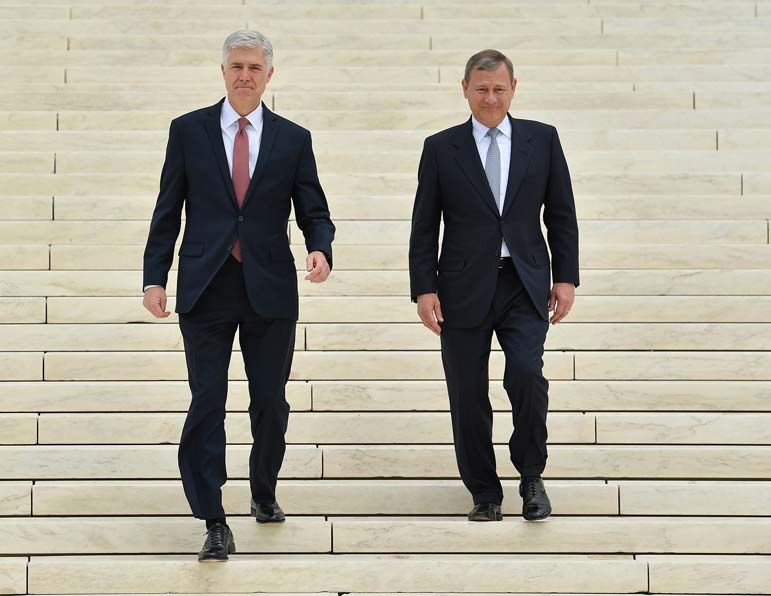 Associate Justice Neil Gorsuch, center left, is accompanied by Chief Justice John Roberts as they walk down the steps of the U.S. Supreme Court. Ricky Carioti -- The Washington Post
Associate Justice Neil Gorsuch, center left, is accompanied by Chief Justice John Roberts as they walk down the steps of the U.S. Supreme Court. Ricky Carioti -- The Washington Post
The Supreme Court last week suspended a Louisiana abortion law, the justices' first significant action in an abortion case since the appointment of Justice Brett Kavanaugh. What does the decision portend for the future of Roe v. Wade in particular and reproductive rights in general?
The case, June Medical Services v. Gee, centers on a challenge to a provision in the Louisiana law (named, tellingly, "the Unsafe Abortion Protection Act") requiring doctors who perform abortions to have admitting privileges at hospitals within 30 miles of the clinic where they perform abortions. The ostensible idea is to have quick access to a hospital in the event that something goes awry, threatening the health of the mother. Critics argued that the effect of the law would be to reduce to one (from the current four) the number of doctors who can perform abortions at the state's three operating clinics.
As a barometer of the court's adherence to precedent, the case is tailor-made, because the court just three years ago struck down, in a 5-to-3 decision, an essentially identical provision in a Texas statute. Applying the governing test from Planned Parenthood v. Casey, the court concluded that the provision conferred scant medical benefits (because abortion is already a safe procedure very rarely requiring hospitalization) while placing a "substantial obstacle" in the path of women seeking the procedure by reducing by more than 50 percent the number of available clinics in the state.
There is no dispute that the Texas case, Whole Woman's Health v. Hellerstedt, provides the controlling law in the Louisiana case.
Given that, a natural course for the court would have been to grant the challenger's motion for a stay of the appellate court's decision, which permitted the Louisiana law to go into effect. The practical result of such a move would be that the law would not operate while the courts considered the challenge to it on the merits next year.
And that's exactly what the court ordered, in a 5-to-4 decision in which the four liberal justices were joined by Chief Justice John Roberts, who had dissented in the Texas case but presumably now recognized Hellerstedt as governing law.
The four were in the court's strongly conservative wing of Clarence Thomas, Samuel A. Alito Jr., Neil M. Gorsuch and Kavanaugh. The first three voted without explanation to deny the stay.
That left Kavanaugh, who issued a lone written dissent to the Louisiana decision by the majority. Kavanaugh readily acknowledged the controlling force of the Hellerstedt precedent. He argued, however, that the court nevertheless should have permitted the law to go into effect as a practical matter to see if it would have the effect that the law's challengers feared. Louisiana had promised it would not "move aggressively to enforce" the law, he wrote, and maybe the three doctors could obtain hospital admission privileges in the meantime. In that case, it might all work out, so better to let the law operate and "resolve the factual uncertainties."
Kavanaugh's argument is tenable, and in a sense, it is respectful of precedent, but the strain here was in the very making of it: The Louisiana law on its face is so strikingly similar to a law the court already has invalidated; the obvious course was to suspend its operation and then fully consider at another time various possible distinguishing arguments. Kavanaugh offered no citations of a similar course in other cases.
So where are we?
There remain four votes to preserve Roe, Casey and its progeny (such as Hellerstedt) with full vigor.
There appear to be three votes ready, if not to overrule Roe, to cut it back to near the point of triviality. Presumably, Thomas, Alito and Gorsuch would not let stand a law (there are a few working their way up the system) declaring that life begins at conception, effectively equating abortion with murder. But that may be about it. Roberts, invested more than any justice with preservation of the court's institutional role, likely will remain a possible vote for the liberals in some abortion cases. But where he doesn't see the court's basic reputation at stake, his instincts will likely be to vote to uphold new restrictions.
As for Kavanaugh, he will never be the fifth vote in an opinion to overrule Roe v. Wade. (That would be his epitaph, not to mention that of Sen. Susan Collins, R-Maine, who voted for Kavanaugh last fall in part because he reassured her that he would be bound on the bench by precedent.) There will be some inroads on abortion rights that will be a step too far for Roberts, who will join with the liberals to strike down; it now seems likely that Kavanaugh will be more inclined than Roberts to join the three other conservatives to vote to uphold.
The court's decision in Casey - which reaffirmed the core of Roe and redoubled the precedential force of the case - was premised in large part on the interests of women who came of age in the confidence of a core entitlement to obtain a pre-viability abortion. The justice whom Kavanaugh clerked for and replaced, Anthony Kennedy, began the court's pivotal opinion by proclaiming, "Liberty finds no refuge in a jurisprudence of doubt."
At the time, conservatives mocked Kennedy's words for their supposed pomposity. The court may now have occasion to write them out of the law altogether. For the current generation of women of reproductive age, the court is in the process of returning the country to a jurisprudence of doubt.
Every weekday JewishWorldReview.com publishes what many in the media and Washington consider "must-reading". Sign up for the daily JWR update. It's free. Just click here.
(COMMENT, BELOW)
Harry Litman is a former U.S. attorney and deputy assistant attorney general. He teaches constitutional law and national security law at the University of California at Los Angeles School of Law and the University of California at San Diego Department of Political Science. Litman served as a law clerk to Supreme Court Justices Thurgood Marshall and Anthony Kennedy. Prior to law school, Litman worked on the Associated Press baseball desk and as a feature film production assistant in New York City.


 Contact The Editor
Contact The Editor
 Articles By This Author
Articles By This Author